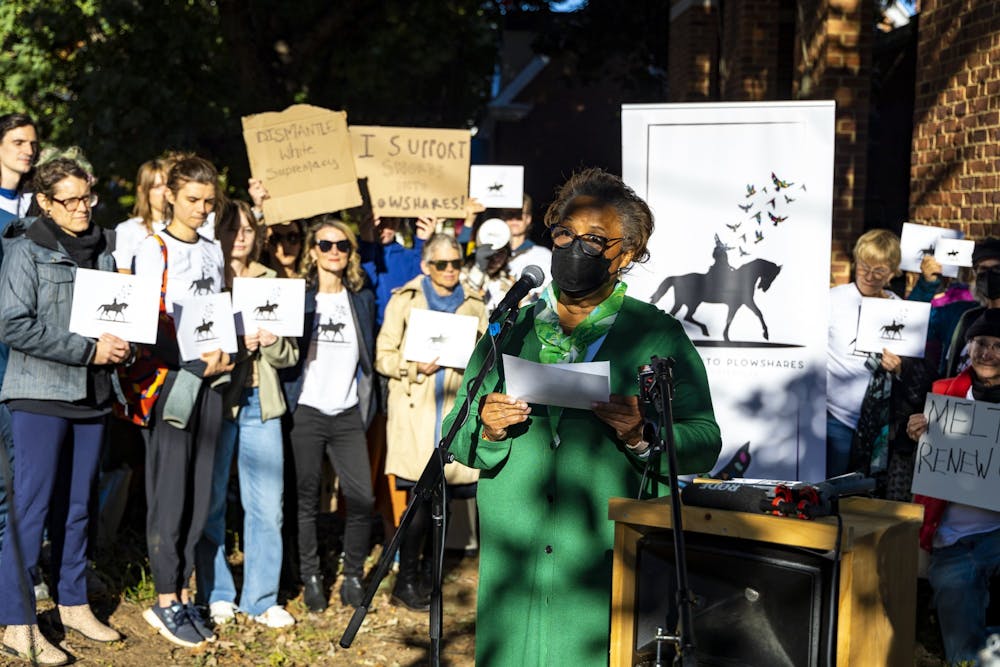Despite the efforts we have made to heal and move forward as a community from the events of summer 2017 and the centuries of racist history preceding it, there are those who continuously try to hinder this progress. One of these community efforts at healing, Swords Into Plowshares, is an ongoing project by community leaders to melt down the Robert E. Lee statue that once stood in Market Street Park. The project would transform the Confederate monument’s materials into a new piece of public art. The original proposal came from the Jefferson School African American Heritage Center after the statue was finally removed in 2021. This removal followed years of local protests and organizing efforts, including a petition authored by fourth-year College student Zyahna Bryant, who was a high schooler at the time. As an Editorial Board, we wholeheartedly support SIP. We are eager to see it take materials of hatred and turn them into tools of reclamation spearheaded by the community itself — to, as the proposal states, “move history forward.”
The project is currently at a halt, however, as the Trevilian Station Battlefield Foundation and the Ratcliffe Foundation filed a lawsuit claiming melting the statue is illegal. After City Council approved the project and donated the statue to JSAAHC, these foundations claimed that while Charlottesville may remove the statue, it cannot destroy it. We are not fooled by these foundations’ attempts at misconstruing community reclamation into destruction as a means of preserving Confederate ideology. TSBF and the Ratcliffe Foundation are both dedicated to this preservation, albeit in different ways. Let us be clear — the Confederate legacy is one that glorifies racism and enslavement.
Monument erection and removal is inherently local. Virginia allows individual localities to decide what monuments go up and come down within their boundaries. This means that national and even state interests fall secondary to the interests of cities and counties themselves. JSAAHC and SIP have held this in mind while planning for the transformation of the Lee statue. SIP’s polling thus far indicates that residents want the statue to be repurposed — one set of respondents actually said they hoped for a functional outcome, such as a public garden. JSAAHC and SIP understand the distinctly communal nature of monument removal that Virginia law dictates, and have incorporated community engagement into their project with this in mind.
TSBF and the Ratcliffe Foundation are not local to the Charlottesville area, however. TSBF is primarily dedicated to preserving the Trevilian Station Battlefield site in Louisa County — not Charlottesville. And the Ratcliffe Foundation operates the Ellenbrook Mansion, where it hopes to gather Confederate monuments, in Rosedale — again, not Charlottesville. These are undeniably outside groups hoping to disrupt a community project here in Charlottesville. It is the same lawyers arguing in the current court case that successfully won the 2017 lawsuit that delayed the Lee statue’s removal. While the students serving on this Editorial Board may not be permanent residents of Charlottesville, we express solidarity with SIP. We do not support either TSBF or the Ratcliffe Foundation’s efforts to preserve Confederate monuments and we thoroughly oppose their efforts to halt progress made in Charlottesville.
While state law is vague, the fact of the matter is that the statue has been placed into the hands of JSAAHC — it is no longer the City’s property. If declared legal by the circuit court, then JSAAHC and SIP would presumably have the right to use the monument’s materials to reflect the community’s wishes. These outsiders have no right to overstep these boundaries and tell JSAAHC what it can and cannot do with the Lee monument.
This case is not scheduled to take place until February. In the meantime, we stand in solidarity with those working on SIP and we admire its truly community-based practices. We believe that, if eventually enacted as we hope it will be, SIP will create an artwork or community space that benefits Charlottesville residents — particularly its Black residents who have time and time again been the ones to establish and lead projects like these.
The Cavalier Daily Editorial Board is composed of the Executive Editor, the Editor-in-Chief, the two Opinion Editors, their Senior Associate and an Opinion Columnist. The board can be reached at eb@cavalierdaily.com.







